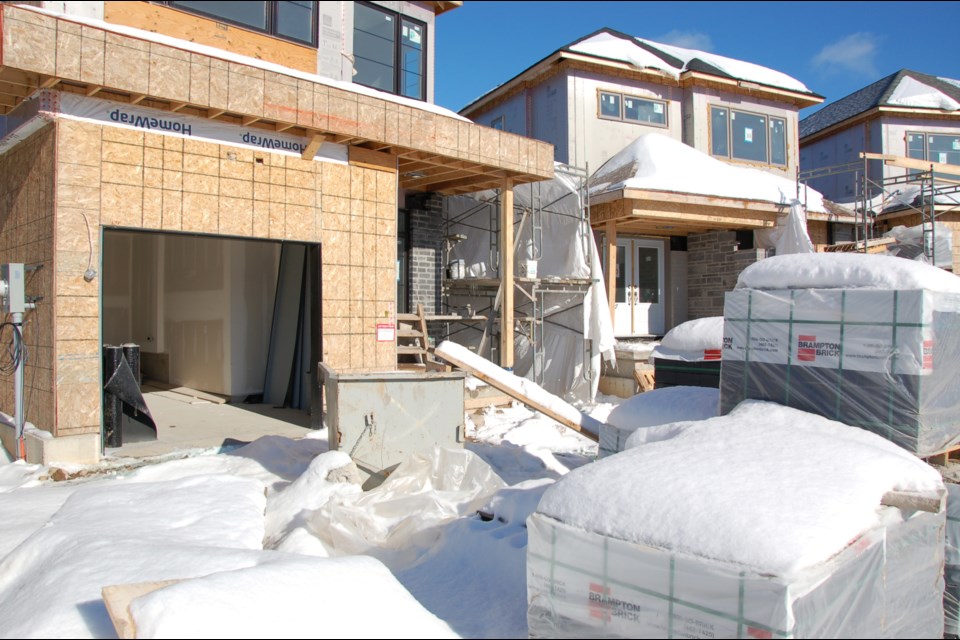Citing concerns about the financial and environmental impact, as well as threats to heritage preservation and quality of life for residents, city council stands united in its opposition to Bill 23, the More Homes Built Faster Act.
“This is going to backfire and, if passed, it will destroy communities across Ontario for decades to come," said Coun. Leanne Caron during a special meeting on Tuesday.
The legislation aims to help create 1.5 million new housing units in Ontario by 2031, with 18,000 of those allocated to Guelph.
Tuesday’s special council meeting was organized so council could comment on the proposed bill, as well as the implementation of the More Homes for Everyone Act, which was enacted in April.
The commenting deadline for Bill 23 is Thursday.
In addition to voicing its opposition, the council-approved motion calls for the commenting period for Bill 23 to be extended beyond the set 30-day limit, up to 66 days, with provincial policies and penalties reviewed regarding approved, but not built, homes.
It’s not clear what the full impact of that bill will be, city staff told council, noting early assessment shows it could result in a two per cent tax increase due to planned decreases to development charges (DCs) and parkland dedication requirements, increased staffing needs as a result of developer refunds if planning timelines aren’t strictly met, and more.
“It’s just very, very disappointing,” said Mayor Cam Guthrie, who said he was excited when plans for a housing table – to involve all three levels of government, developers and other stakeholders – were announced ahead of the provincial election in July. “That never happened.
“A different path could have been chosen,” he added, noting the bill does nothing to “attack” the housing supply shortage.
City staff and delegates, including Fusion Homes senior vice-president Ryan Scott, noted there’s nothing in the legislation that requires developers to pass savings along to prospective buyers.
If ultimately approved, the legislation would implement 50 actions aimed at reducing government fees and speeding up the approval process for new home builds.
Those action items include development charge and parkland dedication exemptions for affordable homes and inclusionary zoning units as well as “select attainable housing units”; freezing of development charges and conservation authority fees for development permits; and reduced property taxes for apartment buildings.
It also proposes new thresholds for the protection of built heritage, changes to the way wetlands are classified and alters how conservation authorities operate.
During the past 20 years, the city’s seen an average of 1,016 new housing units built annually. The most it’s ever done was 1,483, which was in 2004, Krista Walkey, the city’s general manager of planning and building services, told council.
“Certainly we as a city want to design a city that has a sense of place, is safe, has interactive streets, has tree canopy targets, we have net-zero (greenhouse gas emissions) targets, in our opinion, all of which is at risk,” said Walkey.
Preliminary estimates from consultants Watson & Associates, show the city could lose 10 to 15 per cent of its development charge collections under Bill 23. The staff report indicates the city collected $21.1 million in DC, which puts a 10 per cent loss at $2.1 million.
Development Charges are collected to assist with the funding of municipal infrastructure such as roads, water services, recreation and more.
“If growth does not pay for growth, then existing taxpayers will have to cover the rising costs of the increasing infrastructure backlog and the cost of new infrastructure, which is an unsustainable solution,” the staff report states, noting the city already has a $289 million infrastructure backlog.
“From an asset management perspective, and with $100’s of millions worth of infrastructure approaching the end of service life in the next 5-10 years, this represents a serious financial pressure and represents infrastructure that will require improvement to service new growth (e.g., in-fill).”
Several delegates raised particular concern with the timing of Bill 23’s introduction – coming one day after municipal elections – and the limited public input process, which saw the Association of Municipalities of Ontario, the Municipal Finance Officers' Association, the Architectural Conservancy Of Ontario and other groups prevented from making presentations to a provincial committee tasked with gathering feedback.
“Civil society, environmental, community, labour, farm and citizen-based organizations throughout this province have united already in their opposition to the attack on our democratic and community-based governance structure,” said Ron East, chair of the Guelph chapter of the Council of Canadians
“This bill, when it’s implemented, will replace municipal democratic practices with a centralized, autocratic model” that, when combined with the Strong Mayors Act, “opportunity will emerge to replace civic democracy with the absolute rule of a cartel.
“The prospect of building more homes is just an excuse to implement the biggest power grab in the history of this province.”
Others, such as Susan Watson, asked council to lobby for the legislation to be rescinded rather than amended.
“Growth needs to pay for growth,” she said, calling the proposed legislation a “Christmas gift” to developers.
Also of concern for several delegates, as well as council members, is a proposed change to the definition of affordable housing – from no more than 30 per cent of a household’s net income to 80 per cent of market value.
“The definition of affordable housing is insulting,” said Tanya Gevaert. “Bill 23 takes a piecemeal approach to the housing crisis.”
In its submitted comments on Bill 23, the Association of Municipalities of Ontario states preliminary analysis indicates the cost for Ontario’s 29 largest municipalities could reach $1 billion annually between 2023 and 2031.
